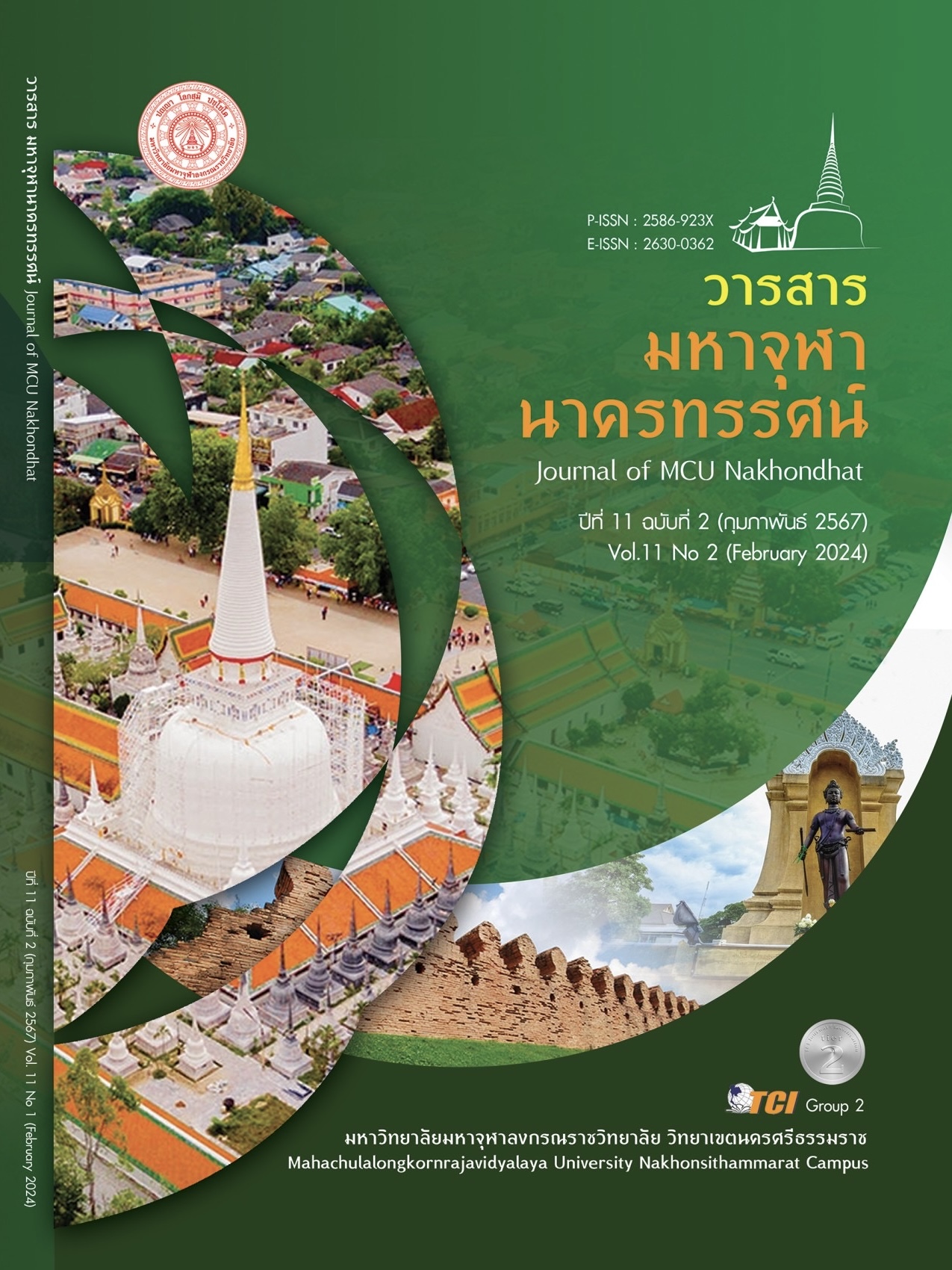T - POP: A STRATEGY FOR COMMUNICATING THAI MUSIC TO BECOME SOFT POWER
Main Article Content
Abstract
This research is qualitative research aimed to study strategies for communicating Thai music to become soft power through Milli's songs and music videos. Milli is a T - Pop artists who is successful in exerting Soft Power and is well-known both in Thailand and abroad and get influencing popular trends and having significant impact. The study involved the analysis of 47 songs and 5 stage shows from 2020 to 2023. Data was collected by researching documents related to relevant concepts and theories and analyzed using textual analysis methods to examine various elements and interpret the meaning of communication, including lyrics, music, music videos, and artist performances. The results of the study found that 1) Communication strategies in Thai music through lyrics and music. Utilize storytelling strategies in song lyrics to tell stories about life, society, and politics. Use slang words and youth vocabulary that are popular in populist culture, including local dialects from various regions. Foreign languages are mixed into the lyrics. As for the music and melody, it was found that a strategy was employed which involved combining Thai music and melodies familiar to listeners, belonging to populist culture. 2) Communication strategies in Thai music through music videos were found to employ colors and unique techniques to create a memorable image of the artist in the song. Incorporate stories from populist culture, along with symbols and signs that convey aspects of life, society, and politics and 3) Communication strategies in Thai music through performances were found to utilize methods for selecting songs that depict stories about lifestyles, society, and populist culture, as well as narratives about the artists. Overall, the show exhibits signs and symbols that convey the identity and attitude of the artist. Employ these strategies to communicate through the song, leading to attraction, acceptance, and increased economic value, ultimately transforming it into soft power
Article Details

This work is licensed under a Creative Commons Attribution-NonCommercial-NoDerivatives 4.0 International License.
References
กษมา ประวีณไว. (2555). ความสัมพันธ์ระหว่างภาพลักษณ์ประเทศไทย และกระแส T - POP ที่มีผลต่อการเดินทางเข้ามาเที่ยวประเทศไทยของนักท่องเที่ยวชาวจีน. กรุงเทพมหานคร: มหาวิทยาลัยนานาชาติแสตมฟอร์ด.
ทยากร แซ่แต้. (2551). มายาคติทางวัฒนธรรมที่ปรากฏในละครเกาหลีและการสร้างประโยชน์ทางธุรกิจ. ใน วิทยานิพนธ์นิเทศศาสตรมหาบัณฑิต สาขานิเทศศาสตรธุรกิจ. มหาวิทยาลัยธุรกิจบัณฑิตย์.
ภัคชุดา อำไพพรรณ. (2558). กลยุทธ์การสื่อสารเพื่อสร้างภาพลักษณ์ของสำนักงานคณะกรรมการกำกับกิจการพลังงานต่อสื่อมวลชน. ใน วิทยานิพนธ์ศิลปศาสตรมหาบัณฑิต สาขานิเทศศาสตร์และนวัตกรรม. สถาบันบัณฑิตพัฒนบริหารศาสตร์.
ภัทรสุฎา มณีพันธุ์. (2557). การสื่อสารด้านการรณรงค์และการเปลี่ยนแปลงค่านิยมทางสังคมที่ส่งผลต่อภาพลักษณ์ของสินค้า ข้าวกล้องไรซ์เบอร์รี่. กรุงเทพมหานคร: มหาวิทยาลัยกรุงเทพ.
ภัสราภรณ์ เหมือนสูงเนิน. (2566). การดึงดูดความสนใจของผู้ชมจากฉากแสดงอารมณ์ของซีรีส์วาย ฉากไหนที่สามารถกระตุ้นยอด Engagement ได้มากที่สุด. ใน สารนิพนธ์การจัดการมหาบัณฑิต สาขาการตลาด. มหาวิทยาลัยมหิดล.
ศิวิไล ชูวิจิตร. (2549). การวิเคราะห์การใช้ภาษาในเพลงไทยสากลของบริษัท อาร์.เอส.โปรโมชั่น 1992 จํากัดช่วงปีพ.ศ. 2542 - 2546. ใน วิทยานิพนธ์การศึกษามหาบัณฑิต สาขาวิชาภาษาไทย. มหาวิทยาลัยศรีนครินทรวิโรฒ.
สำนักงานส่งเสริมเศรษฐกิจสร้างสรรค์. (2565). Soft Power เครื่องมือสำคัญในการผลักดันเศรษฐกิจสร้างสรรค์ไทย. เรียกใช้เมื่อ 25 ธันวาคม 2566 จาก https://www.cea.or.th/th/single-statistic/cea-soft-power.
สุภาพิชญ์ ถิระวัฒน์. (2565). Soft Power อำนาจละมุน. เรียกใช้เมื่อ 25 ธันวาคม 2566 จาก https:// library.parliament.go.th/th/radioscript/rr2565-may7.
อมลณัฐ โสภณ. (2564). การออกแบบมิวสิกวิดีโอรูปแบบแอนิเมชันด้วยหลักสัญศาสตร์ เรื่องการยอมรับตนเอง. ใน การประชุมนำเสนอผลงานวิจัยบัณฑิตศึกษาระดับชาติ ครั้งที่ 16 (น. 362 - 375). มหาวิทยาลัยรังสิต.
อิงอร เนตรานนท์. (2563). พลังอำนาจแห่งชาติซอฟต์พาวเวอร์ของไทยในศตวรรษที่ 21. วารสารสถาบันวิชาการป้องกันประเทศ, 11(1), 33-47.


